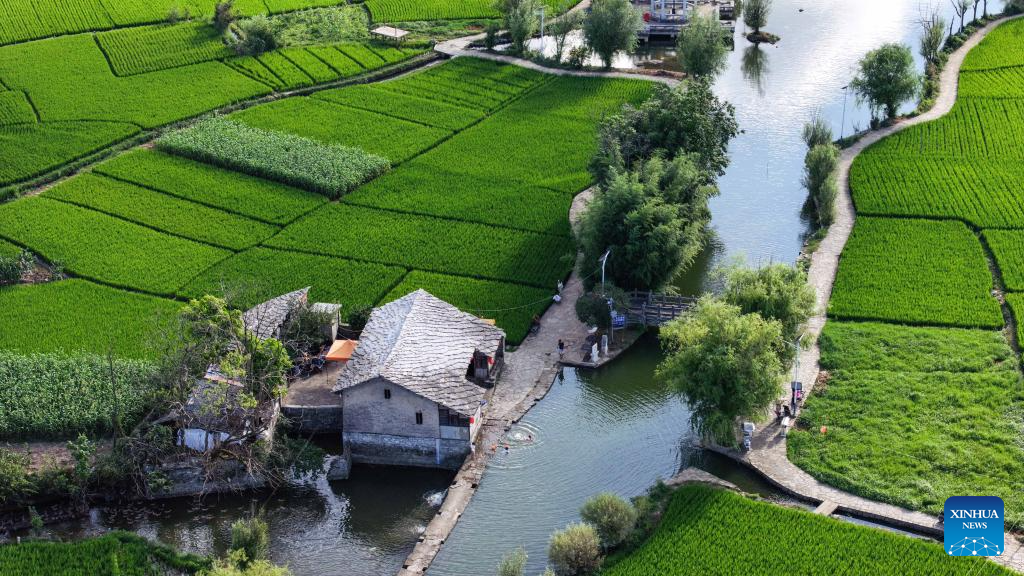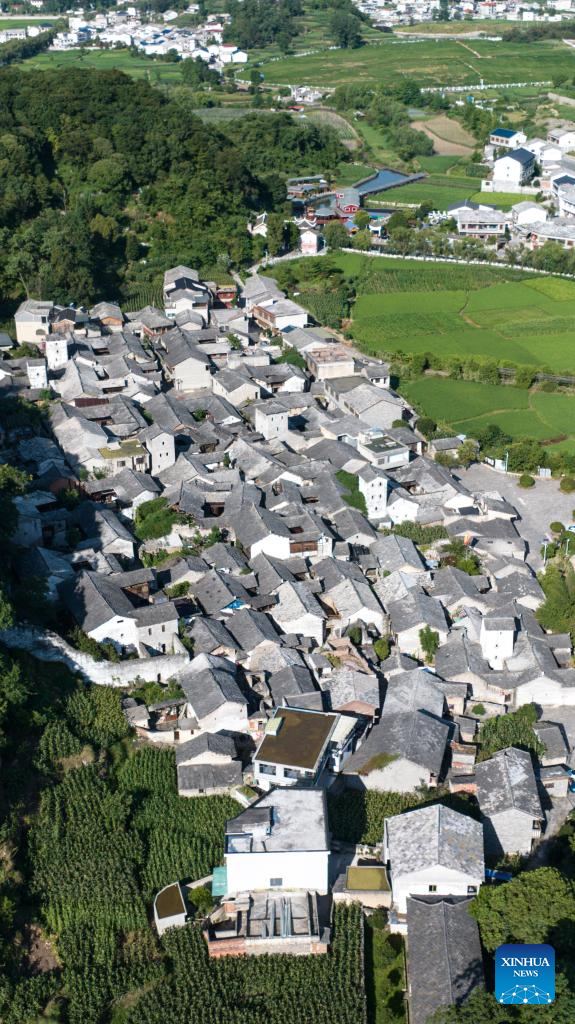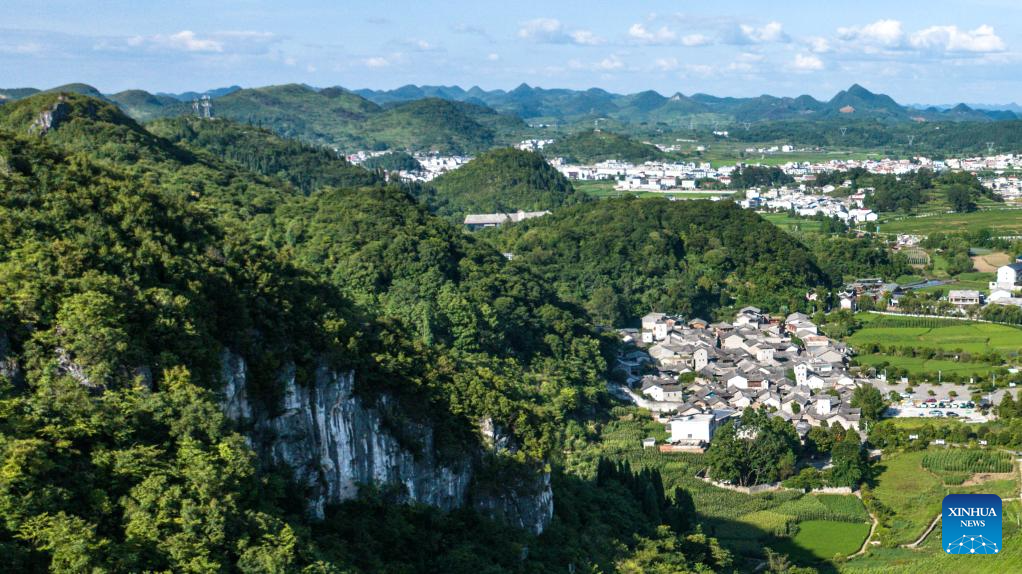
An aerial drone photo taken on July 24, 2024 shows a view of Baojiatun Village in Xixiu District of Anshun City, southwest China's Guizhou Province. In Anshun City, southwest China's Guizhou Province, ancient stone buildings and unique local traditions have made a cluster of villages popular tourist destinations for many visitors. The stone-structured Tunpu residential buildings were built in the Ming Dynasty (1368-1644), when some troops were sent to Anshun, where they built villages and turned the neighborhood into farmland for growing crops. Their descendants have lived there over generations, and formed the unique Tunpu culture which preserved distinctive customs, architectures, operas and costumes of ancient times. (Xinhua/Ou Dongqu)

Kids play in the water in Baojiatun Village, Xixiu District, Anshun City, southwest China's Guizhou Province, July 24, 2024. In Anshun City, southwest China's Guizhou Province, ancient stone buildings and unique local traditions have made a cluster of villages popular tourist destinations for many visitors. The stone-structured Tunpu residential buildings were built in the Ming Dynasty (1368-1644), when some troops were sent to Anshun, where they built villages and turned the neighborhood into farmland for growing crops. Their descendants have lived there over generations, and formed the unique Tunpu culture which preserved distinctive customs, architectures, operas and costumes of ancient times. (Xinhua/Ou Dongqu)

A villager sorts out beans in Benzhai Village, Xixiu District, Anshun City, southwest China's Guizhou Province, July 23, 2024. In Anshun City, southwest China's Guizhou Province, ancient stone buildings and unique local traditions have made a cluster of villages popular tourist destinations for many visitors. The stone-structured Tunpu residential buildings were built in the Ming Dynasty (1368-1644), when some troops were sent to Anshun, where they built villages and turned the neighborhood into farmland for growing crops. Their descendants have lived there over generations, and formed the unique Tunpu culture which preserved distinctive customs, architectures, operas and costumes of ancient times. (Xinhua/Ou Dongqu)

A villager is pictured in Tianlong Tunpu ancient town in Pingba District of Anshun City, southwest China's Guizhou Province, July 25, 2024. In Anshun City, southwest China's Guizhou Province, ancient stone buildings and unique local traditions have made a cluster of villages popular tourist destinations for many visitors. The stone-structured Tunpu residential buildings were built in the Ming Dynasty (1368-1644), when some troops were sent to Anshun, where they built villages and turned the neighborhood into farmland for growing crops. Their descendants have lived there over generations, and formed the unique Tunpu culture which preserved distinctive customs, architectures, operas and costumes of ancient times. (Xinhua/Ou Dongqu)

Villagers chat in Benzhai Village, Xixiu District, Anshun City, southwest China's Guizhou Province, July 23, 2024. In Anshun City, southwest China's Guizhou Province, ancient stone buildings and unique local traditions have made a cluster of villages popular tourist destinations for many visitors. The stone-structured Tunpu residential buildings were built in the Ming Dynasty (1368-1644), when some troops were sent to Anshun, where they built villages and turned the neighborhood into farmland for growing crops. Their descendants have lived there over generations, and formed the unique Tunpu culture which preserved distinctive customs, architectures, operas and costumes of ancient times. (Xinhua/Ou Dongqu)

An aerial drone photo taken on July 23, 2024 shows a view of Benzhai Village in Xixiu District of Anshun City, southwest China's Guizhou Province. In Anshun City, southwest China's Guizhou Province, ancient stone buildings and unique local traditions have made a cluster of villages popular tourist destinations for many visitors. The stone-structured Tunpu residential buildings were built in the Ming Dynasty (1368-1644), when some troops were sent to Anshun, where they built villages and turned the neighborhood into farmland for growing crops. Their descendants have lived there over generations, and formed the unique Tunpu culture which preserved distinctive customs, architectures, operas and costumes of ancient times. (Xinhua/Ou Dongqu)

This photo taken on July 24, 2024 shows a view of Baojiatun Village in Xixiu District of Anshun City, southwest China's Guizhou Province. In Anshun City, southwest China's Guizhou Province, ancient stone buildings and unique local traditions have made a cluster of villages popular tourist destinations for many visitors. The stone-structured Tunpu residential buildings were built in the Ming Dynasty (1368-1644), when some troops were sent to Anshun, where they built villages and turned the neighborhood into farmland for growing crops. Their descendants have lived there over generations, and formed the unique Tunpu culture which preserved distinctive customs, architectures, operas and costumes of ancient times. (Xinhua/Ou Dongqu)

A villager walks in Tianlong Tunpu ancient town in Pingba District of Anshun City, southwest China's Guizhou Province, July 25, 2024. In Anshun City, southwest China's Guizhou Province, ancient stone buildings and unique local traditions have made a cluster of villages popular tourist destinations for many visitors. The stone-structured Tunpu residential buildings were built in the Ming Dynasty (1368-1644), when some troops were sent to Anshun, where they built villages and turned the neighborhood into farmland for growing crops. Their descendants have lived there over generations, and formed the unique Tunpu culture which preserved distinctive customs, architectures, operas and costumes of ancient times. (Xinhua/Ou Dongqu)

An aerial drone photo taken on July 23, 2024 shows a view of Yunshantun Village in Xixiu District of Anshun City, southwest China's Guizhou Province. In Anshun City, southwest China's Guizhou Province, ancient stone buildings and unique local traditions have made a cluster of villages popular tourist destinations for many visitors. The stone-structured Tunpu residential buildings were built in the Ming Dynasty (1368-1644), when some troops were sent to Anshun, where they built villages and turned the neighborhood into farmland for growing crops. Their descendants have lived there over generations, and formed the unique Tunpu culture which preserved distinctive customs, architectures, operas and costumes of ancient times. (Xinhua/Ou Dongqu)

A villager (back) makes shoe soles in Tianlong Tunpu ancient town in Pingba District of Anshun City, southwest China's Guizhou Province, July 25, 2024. In Anshun City, southwest China's Guizhou Province, ancient stone buildings and unique local traditions have made a cluster of villages popular tourist destinations for many visitors. The stone-structured Tunpu residential buildings were built in the Ming Dynasty (1368-1644), when some troops were sent to Anshun, where they built villages and turned the neighborhood into farmland for growing crops. Their descendants have lived there over generations, and formed the unique Tunpu culture which preserved distinctive customs, architectures, operas and costumes of ancient times. (Xinhua/Ou Dongqu)

An aerial drone photo taken on July 23, 2024 shows a view of Benzhai Village in Xixiu District of Anshun City, southwest China's Guizhou Province. In Anshun City, southwest China's Guizhou Province, ancient stone buildings and unique local traditions have made a cluster of villages popular tourist destinations for many visitors. The stone-structured Tunpu residential buildings were built in the Ming Dynasty (1368-1644), when some troops were sent to Anshun, where they built villages and turned the neighborhood into farmland for growing crops. Their descendants have lived there over generations, and formed the unique Tunpu culture which preserved distinctive customs, architectures, operas and costumes of ancient times. (Xinhua/Ou Dongqu)

An aerial drone photo taken on July 23, 2024 shows a view of Benzhai Village in Xixiu District of Anshun City, southwest China's Guizhou Province. In Anshun City, southwest China's Guizhou Province, ancient stone buildings and unique local traditions have made a cluster of villages popular tourist destinations for many visitors. The stone-structured Tunpu residential buildings were built in the Ming Dynasty (1368-1644), when some troops were sent to Anshun, where they built villages and turned the neighborhood into farmland for growing crops. Their descendants have lived there over generations, and formed the unique Tunpu culture which preserved distinctive customs, architectures, operas and costumes of ancient times. (Xinhua/Ou Dongqu)



